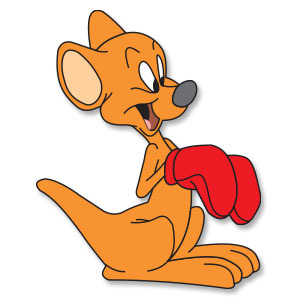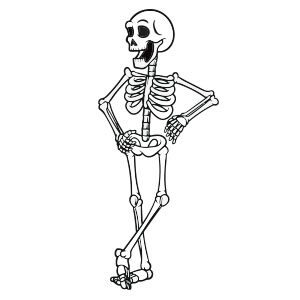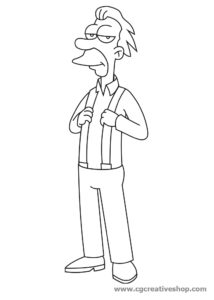Hippety Hopper is a young kangaroo cartoon character in the Warner Bros. Looney Tunes series of cartoons. Robert McKimson introduced Hippety Hopper in Hop, Look and Listen (1948), which established the pattern for future Hippety Hopper cartoons. Hippety Hopper cartoons have a typical formula: Hopper escapes from a zoo, circus, etc., and is mistaken for a giant mouse by Sylvester the cat. Frequently, Hopper changes places with an actual mouse, generally when it is most embarrassing for Sylvester. Sylvester tries to capture and eat his “prey”, but the innocent and infantile Hippety mistakes Sylvester’s predations for a game of rough-housing. Sylvester is repeatedly punched, kicked, juggled, spun, and pounced, but each failure only strengthens his desire to have the “mouse” for lunch. Hippety Hopper returns in McKimson’s Pop ‘Im Pop! (1950), in which proud papa Sylvester boasts of his mousing skills to his son, Sylvester Jr.
In Cats A-Weigh! (1953), Sylvester Cat accepts a position as mouse-catcher on a ship. He encounters Hippety Hopper being shipped from Australia. Sylvester mistakes Hippety Hopper once again for a giant mouse, and the baby kangaroo promptly beats the cat soundly. Junior is mortified, but the true victim is Sylvester, humiliated by a mere “mouse” in front of his own son. McKimson would continue the Sylvester/Hippety Hopper series for 16 years, varying it slightly from cartoon to cartoon. In Bell Hoppy (1954), for example, in a twist on “belling the cat”, Sylvester must hang a bell around a mouse’s neck in order to join the “Loyal Order of Alley Cats and Mousing and Chowder Club”. In Lighthouse Mouse, Sylvester must guard a lighthouse from the baby kangaroo and a mouse who wants nothing more than to turn it off. Hoppy Go Lucky (1952) was a parody of Of Mice and Men, with Sylvester accompanied by the giant, simple-minded cat “Bennie,” who wants a mouse “to hug and pet.” The central theme is always the same: Sylvester is shamed for his failure to capture a simple “mouse”. The Hippety Hopper/Sylvester cartoons ended in 1964 when the Warner Bros. studio closed its animation unit.















